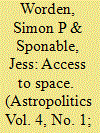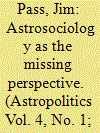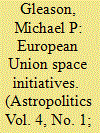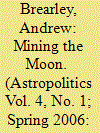|
|
|
Sort Order |
|
|
|
Items / Page
|
|
|
|
|
|
|
| Srl | Item |
| 1 |
ID:
072005


|
|
|
|
|
| Publication |
2006.
|
| Summary/Abstract |
The United States (US) launch infrastructure is at a crisis point. Human access to space embodied in the Space Shuttle is due to be phased out by 2010. Currently, there are no heavy lift, 100 ton class launchers to support the US national vision for space exploration. Medium and large expendable launch providers, Boeing's Delta IV, and Lockheed-Martin's Atlas V Evolved Expendable Launch Vehicles are so expensive that the Delta no longer carries commercial payloads and the Atlas is unlikely to show significant growth without equally significant cost reductions and commercial traffic growth. This set of circumstances questions US dependence on these launch vehicles for national security purposes. High cost growth also exists with small launch vehicles, such as Pegasus, and the promising new field of small and microsatellites is little developed in the US, while foreign efforts, particularly European, are expanding largely on the availability of low-cost Russian boosters. One bright point is the emerging private sector, which is initially pursuing suborbital or small lift capabilities. Although such vehicles support very limited US Department of Defense or National Aeronautics and Space Administration spaceflight needs, they do offer potential technology demonstration stepping stones to more capable systems needed in the future of both agencies. This article outlines the issues and potential options for the US Government to address these serious shortcomings.
|
|
|
|
|
|
|
|
|
|
|
|
|
|
|
|
| 2 |
ID:
072006


|
|
|
|
|
| Publication |
2006.
|
| Summary/Abstract |
Astrosociology represents a distinctive emergent field within the sociological discipline and outside of it, inclusive of the other social sciences and a strong connection to the natural sciences. It provides a heretofore absent focus that partly serves to complement the work of space scientists and engineers, including the space policy issues that guide the direction of their work. By adopting astrosociology, this missing perspective increases the current scope of attention by adding its focus on the societal implications of human developments related to space generally and space exploration specifically. This relationship between space and society, viewed in both causal directions, influences social change within any particular society and possesses implications for future projects and missions. Astrosociology adds a sociocultural dimension to the conventional approach of space sciences that currently devalues a social science orientation. With the addition of astrosociology, practitioners of space will become exposed to decision-making criteria normally unavailable to them under current circumstances.
|
|
|
|
|
|
|
|
|
|
|
|
|
|
|
|
| 3 |
ID:
072003


|
|
|
|
|
| Publication |
2006.
|
| Summary/Abstract |
The European Union (EU) is the newest actor in the European space sector and is cultivating the political will to make Europe a world class space power comparable to the United States (US). The Galileo satellite system and the Global Monitoring for the Environment and Security space program are the most visible manifestations of this will. This article suggests that Europe can approach comparable space power if capabilities are considered rather than just budgets. The paper discusses the catalysts driving EU space initiatives, and assesses the EU's nascent European Space Policy and European Space Program, and EU organization and funding for space. Of importance are the asymmetric means for Europe to increase its space capabilities and the implications this has for the trans-Atlantic relationship with the US. The analysis is directed to the security, civil, and dual-use space sectors within the security aspects of EU space initiatives. This article also provides a baseline to track changes in EU space policy, organization, and funding dynamics.
|
|
|
|
|
|
|
|
|
|
|
|
|
|
|
|
| 4 |
ID:
072004


|
|
|
|
|
| Publication |
2006.
|
| Summary/Abstract |
The legal regime under which the resources of the Moon can be exploited is unclear. Recent proposals indicate that states are now planning to return to the Moon. Lunar resources offer great potential, both for terrestrial applications and in the exploration of space. The possibility of resource use, in the foreseeable future, creates the need for a clarification of the legal regime in relation to the Moon. This paper explores the present legal situation, identifies shortcomings in space law, and seeks precedents in the structures that are in place to govern other global Commons. The Third United Nations Convention on the Law of the Sea is assessed as the most relevant treaty, as it regulates the use of resources located outside of the state, and it can provide an analogy for a potential regime to govern the resource utilization of the Moon. The Law of the Sea reveals further problems concerning an international agreement, for the regime highlights the discontent between developed and developing states. This draws attention to the situation concerning the Moon's legal status, for although a regime to govern lunar activities is preferable, it would likely be formed in circumstances where technologically advanced states are aware of the lunar resources which they can potentially monopolize.
|
|
|
|
|
|
|
|
|
|
|
|
|
|
|
|
|
|
|
|
|